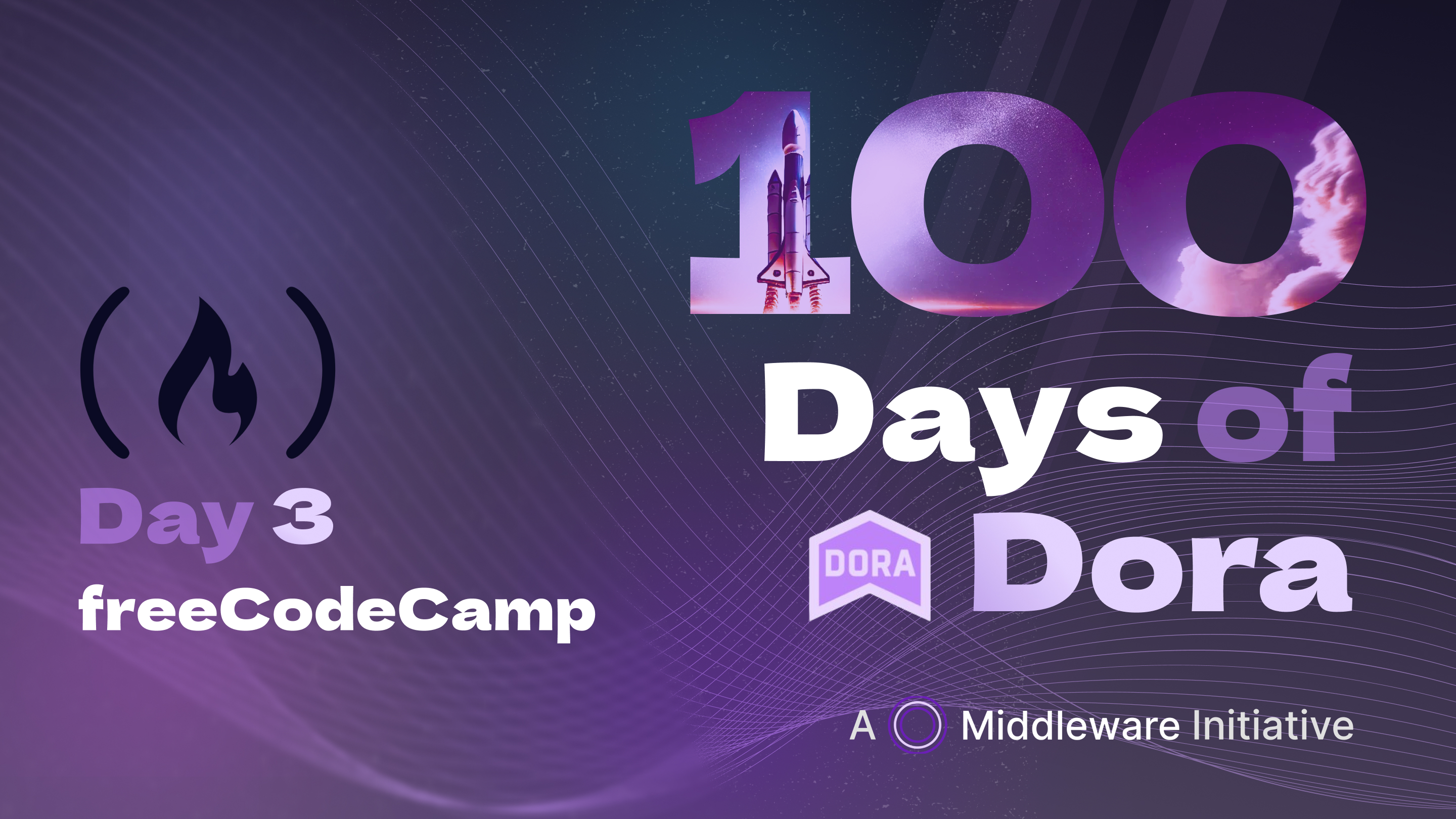Is freeCodeCamp Sacrificing Quality for Speed with Their Rapid Deployments?
 Rajni Rethesh
Rajni RetheshTable of contents
- Introduction
- What is Dora Metrics?
- The Numbers Don’t Lie
- So, What’s freeCodeCamp’s Secret Weapon?
- Highlighted PRs showing off this slick operation:
- The Not-So-Perfect Side: freeCodeCamp’s Rework Time Could Use Some Love
- What’s Brewing in the freeCodeCamp Repo?
- Impact on the Community
- Takeaways You Can Steal
- DORA Score: 8/10
- Code Like a Jedi: How freeCodeCamp's Deployment Secrets and Middleware OSS Can Level Up Your Game
- Further Resources

Introduction
Ever wonder how freeCodeCamp manages to stay on top of its game, keeping things fresh and running smoothly for millions of coders around the world? It’s all about how well they maintain their rhythm. This community-driven code repository has perfected deployment frequency. Whether it’s squashing bugs, rolling out new features, or pushing improvements, they make sure that updates reach users faster. So, how do they keep everything moving at lightning speed?
Naturally, we got curious. How does the freeCodeCamp repository manage to pull this off with such precision? So, we strapped on our thinking caps and started digging into their deployment stats, workflows, and codebases.
What we found out was impressive! To find their secret weapon, read on.
If you're itching to spark some debates with fellow engineering leaders, dive into The Middle Out Community!
But first things first. Let's start with the basics of Dora Metrics.
What is Dora Metrics?
Dora Metrics are like a performance scorecard for DevOps practices. Here’s the cheat sheet:
Deployment Frequency: How often code gets shipped to production.
Lead Time for Changes: How long it takes for a commit to go live.
Change Failure Rate: The percentage of deployments that cause issues.
Mean Time to Restore (MTTR): The time it takes to fix those issues.
These metrics give teams a reality check on how well they’re doing in the DevOps game.
The Numbers Don’t Lie
Alright, let’s break down what freeCodeCamp’s been absolutely slaying: deployment frequency. They’ve turned pushing updates into a lightspeed maneuver and the numbers are wild.
June 2024: 55 deployments. Not bad, right?
July 2024: 118 deployments. Oh, they're picking up speed!
August 2024: 146 deployments. Now they’re flying!
This is what happens when you’ve got a killer mix of automation and a super passionate community of contributors. It’s like having a team of coders who are so synced up, they could finish each other’s commits. They’re not just deploying—they’re hitting the gas pedal, and it’s not slowing down anytime soon!
So, What’s freeCodeCamp’s Secret Weapon?
Automated CI/CD Pipelines: The Unseen MVP
Think of automated CI/CD pipelines as the backstage crew at a rock concert. They’re not in the spotlight, but without them, the whole show would fall apart. These pipelines handle all the grunt work, taking code from development to production with zero sweat (and zero broken apps).
No manual fiddling, no panic attacks—just smooth, seamless deployments that let the freeCodeCamp team focus on the fun stuff, like writing new features or fixing bugs.
Small, Bite-Sized Changes: Avoiding Code Overload
Ever tried eating a giant burger in one bite? Yeah, not a good idea. freeCodeCamp knows better. They slice their updates into small, manageable pieces, making them easy to chew—er, I mean, test and deploy.
This way, they avoid the massive code dumps that lead to messy rollbacks and late-night debugging marathons. It’s all about keeping it simple, steady, and drama-free.
Community Power: The FreeCodeCamp Super Squad
When you’ve got a huge community of contributors, you’ve basically got a coding army at your disposal. freeCodeCamp taps into this power by encouraging contributions from coders all over the world.
The result? There’s always a fresh wave of updates, fixes, and features ready to go live. More hands on deck means faster progress, and with this squad, freeCodeCamp stays on the cutting edge without breaking a sweat.
Highlighted PRs showing off this slick operation:
#55259 - Minor Cookie Fixes
This PR might sound small, but these cookies are essential. Whether it’s handling sessions or remembering user preferences, cookies are the little bites of code that make your browsing experience smooth. A quick fix here, a tweak there, and boom—your cookies are back to being the perfect treat, without the crumbs.
#55265 - Linting Upgrades (Keeping the Code Squeaky Clean)
Linting is essential for maintaining clean code. This PR makes sure that every line of code is up to standard, polished, and free of any pesky errors. Because let’s face it, clean code is happy code, and no one wants to debug a mess.
#55249 - JS Forum Leaderboard Tweaks (Even Leaderboards Need a Little TLC)
Leaderboards are where the action happens, and they deserve some love too. This PR adds a few finishing touches to the JS forum leaderboard project, ensuring everything runs smoothly and looks sharp. After all, if you’re going to show off your coding skills, you want that leaderboard to be in top shape!
The Not-So-Perfect Side: freeCodeCamp’s Rework Time Could Use Some Love
Now, let’s get real for a moment—freeCodeCamp isn’t all sunshine, rainbows, and rapid deployments. There’s one area that could use a little TLC: Rework Time. Yup, those annoying moments when code needs a second (or third) round of polishing before it’s good to go.
Rework Time Breakdown:
June 2024: 40.6 hours
July 2024: 22.3 hours (A brief victory!)
August 2024: 38.1 hours
Why the Struggle with Rework Time?
So, what’s the deal? Why are these numbers slightly increasing over time?
Complex Changes
Sometimes, the code isn't just your everyday tweak—it’s like trying to decipher a riddle written in a foreign language you barely understand. These sophisticated changes often need a bit of rework after the first review.
Review Bottlenecks
Reviewers aren’t always on standby. When they’re swamped, things can get backed up, leading to delays and—you guessed it—more rework to keep up with shifting requirements.
What’s Brewing in the freeCodeCamp Repo?
So, what’s brewing in the freeCodeCamp repo, these days? Well, it’s a mix of new features, security upgrades, and performance enhancements that’ll make your coding journey smoother than ever.
Let’s break it down:
New Front-End Certification Skeleton (PR #55231)
The New Front-End Certification Skeleton (PR #55231) is like giving the front-end certification a brand-new makeover. This PR revamps the entire framework, setting up a sleek, modern structure to help you navigate your front-end journey with ease. It’s akin to upgrading from a basic toolkit to a top-of-the-line set—this update ensures that every aspiring front-end developer has a clear, well-organized path to master their skills. With this new setup, you'll have a cutting-edge framework that makes your certification journey smoother and more impressive.
API Security Upgrades with Authorization Code Flow (PR #55413)
Security is no joke, and freeCodeCamp is beefing up their defenses with this update. The authorization code flow is like adding an extra lock on the door to keep out the bad guys. So while you’re busy coding, they’re making sure your data stays safe and sound. Nice, right?
Server Plugin Enhancements for Better Cookie Handling (PR #55395)
Cookies aren’t just for snacking—they’re crucial for keeping your web experience smooth. This update ensures those cookies are handled with care, making your time on the platform as seamless as possible. It’s like upgrading from store-bought to gourmet!
These updates are a power-packed combo: new learning content, tighter security, and better performance. In other words, it’s a win-win-win for everyone involved.
Impact on the Community
Thanks to their quick deployment strategy, freeCodeCamp keeps its learners and contributors constantly in the loop with the latest features and fixes. It’s like a never-ending stream of improvements that keeps everyone coming back for more. Who wouldn’t trust a platform that’s always getting better?
Takeaways You Can Steal
Automate Your CI/CD Pipelines
Like freeCodeCamp, let the machines do the grunt work so you can focus on more interesting stuff.
Keep Changes Small and Sweet
Fewer lines of code = fewer headaches.
Get the Community Involved
More contributors mean more perspectives and faster progress. Just like freeCodeCamp’s buzzing hive of coders.
DORA Score: 8/10

Here’s the lowdown on freeCodeCamp after putting it through the Dora Metrics lens: They score a solid 8/10.
Their deployment frequency is top-notch—code goes live faster than you blink your eyes that too with minimal facepalm moments. But, like any coding superstar, even freeCodeCamp has its off days, especially when it comes to tightening those cycle times and cutting down on rework.
The moral of the story?
Even the mighty freeCodeCamp has room to polish their workflow for that extra bit of perfection. And if you’re curious to see how your project stacks up or want to turn your team into a productive one, Middleware OSS is your weapon of choice.
Code Like a Jedi: How freeCodeCamp's Deployment Secrets and Middleware OSS Can Level Up Your Game
The freeCodeCamp repo is basically the Yoda of deployment frequency. They’ve mastered the art of getting the latest and greatest code out to users faster than you can say “Hello, World!” It’s a never-ending cycle of updates, improvements, and new features that keep the community buzzing with excitement.
So, what’s their secret? It’s all about automation, iteration, and community power.
Automate your processes like a pro so your code moves seamlessly from dev to live without breaking a sweat.
Keep your updates small and frequent—think bite-sized changes that are easy to review and deploy. And don’t forget to tap into the wisdom of the crowd—getting your community involved means more hands on deck and faster progress.
Ready to take your project to the next level? Follow freeCodeCamp’s lead and make your deployments smoother.
If you're interested in diving deeper into these case studies or chatting with fellow engineering leaders, hop over to The Middle Out Community.
Bonus Trivia or News
Fun fact: Quincy Larson, the founder of freeCodeCamp, originally started the platform as a simple tool for his students to practice coding. Fast forward, and it’s now a massive global community with millions of learners. Talk about a glow-up!
Further Resources
Subscribe to my newsletter
Read articles from Rajni Rethesh directly inside your inbox. Subscribe to the newsletter, and don't miss out.
Written by

Rajni Rethesh
Rajni Rethesh
I'm a senior technical content writer with a knack for writing just about anything, but right now, I'm all about technical writing. I've been cranking out IT articles for the past decade, so I know my stuff. When I'm not geeking out over tech, you can catch me turning everyday folks into fictional characters or getting lost in a good book in my little fantasy bubble.